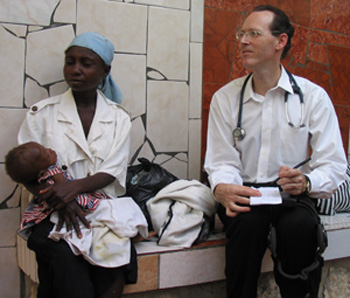Remembering Paul Farmer

A magnificent star went dark when Paul Farmer, the great humanitarian, physician, and anthropologist, died in his sleep last Monday, February 21, on the grounds of a hilltop university health complex he’d helped establish in rural Rwanda.
He was only 62. It seems he suffered a massive heart attack.
Since I first learned of Dr. Farmer’s work with Partner’s in Health (PIH), the extraordinary nonprofit he co-founded back in 1987, I was inspired by his vision, mission, and values which go to the heart of every social justice credo I’ve ever read.
It’s easy to write lofty mission and belief statements. The walls of the cynical and sanctimonious are filled with them.
It’s another matter to muster the collaborative energy and force of character that wills them into being. Few have done it with such skill, courage, and resilience as Paul Farmer, in the face of daunting obstacles. Only Gandhi and Martin Luther King, Jr. come to mind when one considers who else might fit in this pantheon of humanitarian giants.
To get a feel for the magnitude of Paul Farmer’s achievement, try this imaginal experiment.
Gaia calls you forth and charges you with the following mission (excerpted from PIH’s website): Provide a preferential option for the poor of this planet in health care. At its root, your mission is both medical and moral. It is to be based on solidarity, rather than charity alone.
You ask: What moral precepts shall I adopt to guide our work?
Gaia answers: Your success will be evaluated by the degree to which you implement the following moral tenets:
1. All human lives have the same value, and every human being has the inalienable right to be healthy to fulfill their potential.
2. The right to health is not the only right held by our patients. Other fundamental human rights are interrelated and just as inalienable.
3. All people need to stand in solidarity with those who find themselves at the margins of modern society.
4. The playing field needs to be leveled for those individuals who are born at a disadvantage (equity vs equality).
5. Injustice is not accidental but a direct result of structural violence and oppression. We can fight injustice by changing those dynamics.
6. It is our moral call to action to expose social injustice and to work toward correcting those systemic forces that create inequalities, no matter how impossible or challenging this task might look.
Though we approach the challenge of social injustice from different angles, I’ve always been struck by the congruence of IISC’s mission —”to build collaborative capacity in individuals, organizations, and networks working for social justice and racial equity” — with that of Partners in Health. And there is no doubt that we share the same set of moral convictions in going about our work.
Tracy Kidder documented this labor of love in “Mountains Beyond Mountains” in 2003, shadowing Farmer through rural Haiti, Cuba, Peru, Siberia, Rwanda, and Lesotho, as he hiked hours to the homes of patients to be sure they were taking their medicine. From the prisons and barrios of Lima to the gulag of Siberia, and throughout rural Africa, he shone his light where the world had turned an indifferent eye. Thousands are alive today because Paul Farmer lived; his love for his patients will forever be his legacy.
As long-standing friends and partners who’ve known of my admiration and commitment to Dr. Farmer’s work, I invite you to take a few moments to peruse Partners in Health’s website and consider making a donation in honor of his life and work — one of great love, generosity, and courage that made the world a better place.
Now it’s up to the rest of us to ensure that his spirit lives on — his moral flame an eternal sanctuary for the marginalized.
May he rest in peace.
Thomas J. Rice, Co-founder and former IISC Board Chair (1992-2012)
Leave a comment